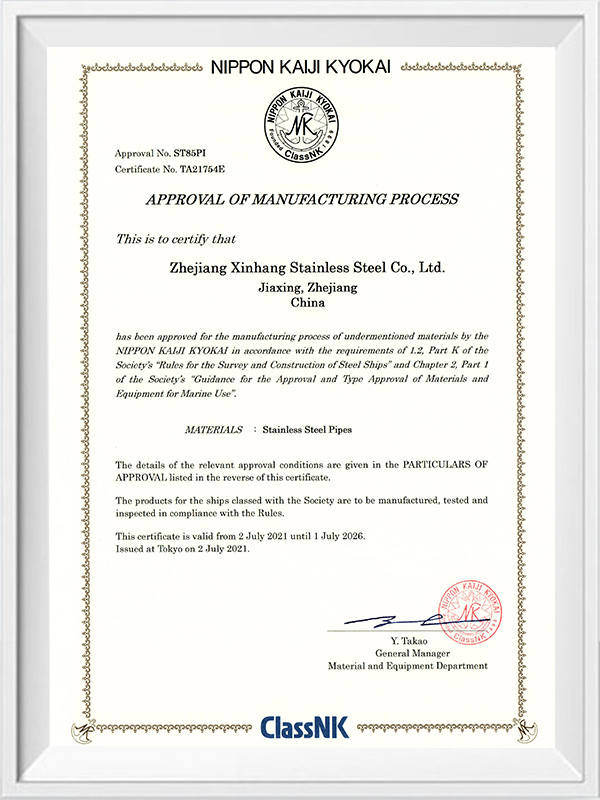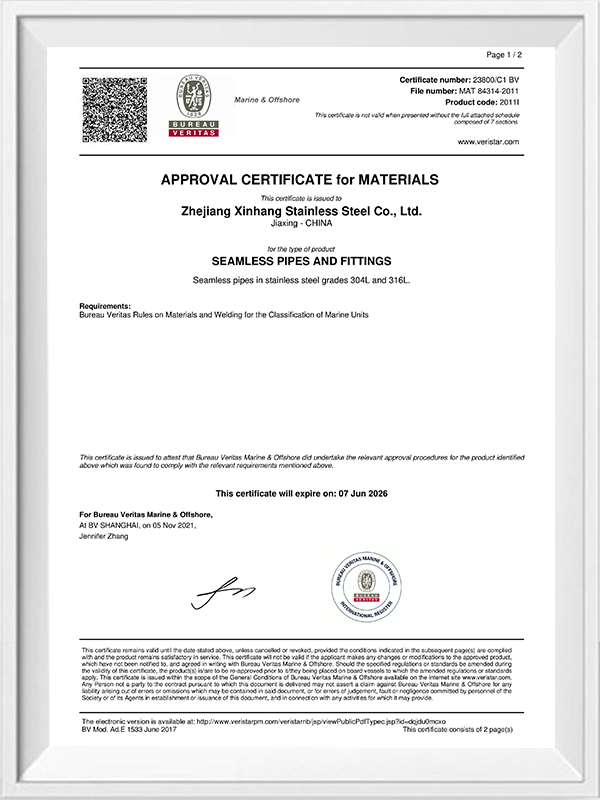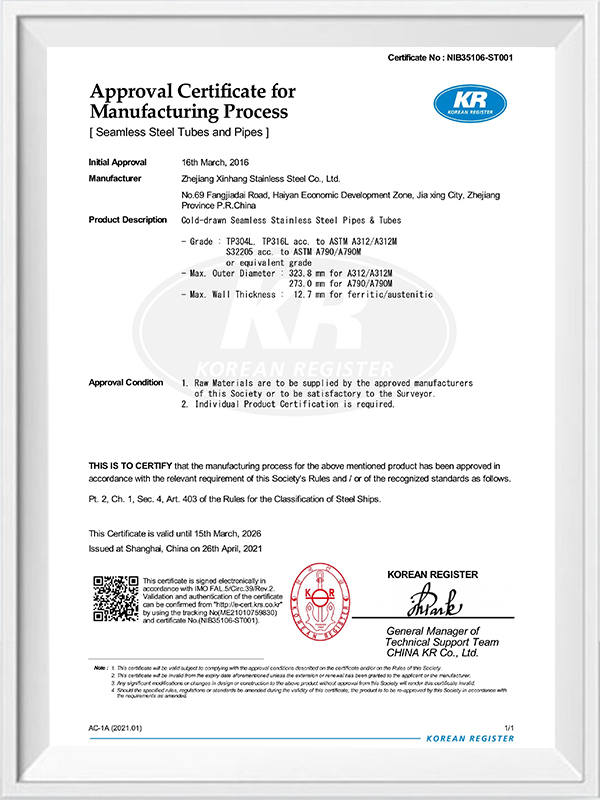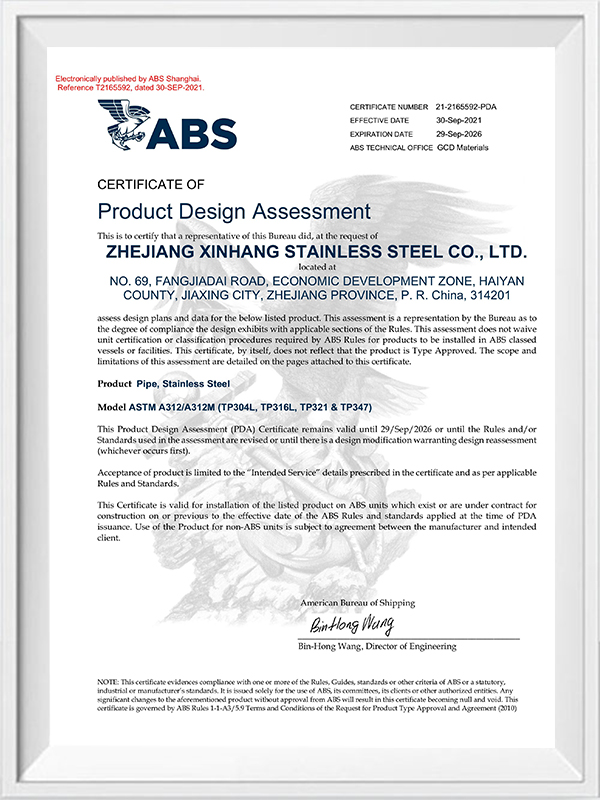

Xinhang Special Material Co., Ltd. Hangzhou Branch is China Stainless Steel electrical pipe Suppliers and Stainless Steel electrical pipe Factory, founded in 2007 and moved to Longyou Economic Development Zone, Zhejiang Province, in 2022. It covers an area of 130,000 square meters, more than 30 production lines, 300 workers, 20 R&D people, 30 inspection people and an annual output of 50,000 tons.
It has passed ISO9001:2008 quality management system, PED 97/23/EC EU Pressure Equipment Directive certification, China Special Equipment Manufacturing License (Pressure Tube) TS certification, ASME certification, provincial enterprise standardization management system, ISO14000:2004 environment management system, cleaner production (green enterprise), and a series of certifications, as well as China Classification Society (CCS), American Bureau of Shipping (ABS), British Register of Shipping (LR), Deutsche Veritas (GL), Bureau Veritas Society (BV), Det Norske Veritas (DNV), and Korean Register of Shipping (KR) factory certification.
The main products include stainless steel pipes, pipe fittings, flanges, valves, etc., which are widely used in petroleum, chemical industry, nuclear industry, smelting, shipbuilding, pharmaceuticals, food, water conservancy, electric power, new energy, mechanical equipment, and other fields. The company adheres to the corporate tenet of "quality for survival, reputation for development" and wholeheartedly serves every customer to create a win-win situation.




Bottom line: how to weld stainless steel pipe without sugar and leaks For most stainless steel pipe work, the most reli...
View MoreDirect answer: what a “stainless steel pipe pressure rating” really means A stainless steel pipe does not have one univ...
View MoreIn our shop, bending stainless steel pipe is one of those operations that looks simple but punishes shortcuts. Stainless...
View MoreWhat SCH 10 stainless steel pipe specifies (and what it doesn’t) In piping specifications, “SCH” (schedule) is shorthan...
View MoreWhat are the main advantages of using stainless steel electrical pipes over other materials?
Corrosion Resistance: Stainless steel is highly resistant to corrosion, rust, and staining, making it ideal for use in environments where moisture or chemicals are present. This resistance extends the lifespan of the pipes and reduces the need for maintenance.
Strength and Durability: Stainless steel is a strong and durable material, capable of withstanding high pressure and mechanical stresses. This makes it suitable for both indoor and outdoor applications, including those in harsh environments.
Temperature Resistance: Stainless Steel electrical pipe can withstand extreme temperatures without losing its structural integrity, making it suitable for use in both high and low-temperature environments.
Hygienic Properties: Stainless steel is non-porous and easy to clean, making it resistant to bacteria growth and ideal for applications where cleanliness is important, such as in the food and pharmaceutical industries.
Aesthetic Appeal: Stainless steel has a sleek and modern appearance that can enhance the overall aesthetic of a space. It is available in various finishes, allowing for customization to match different design schemes.
Environmentally Friendly: Stainless steel is fully recyclable, making it an environmentally friendly choice for electrical piping applications. Additionally, its long lifespan reduces the need for frequent replacements, further minimizing environmental impact.
Fire Resistance: Stainless steel has excellent fire resistance properties, making it suitable for use in fire-rated assemblies and applications where fire safety is a concern.
Are there any specific tools or techniques required for installing stainless steel electrical pipes?
Pipe Cutters: Stainless steel pipes may require specialized pipe cutters designed to cut through metal pipes cleanly and accurately. These cutters can ensure precise cuts without damaging the pipe's surface or compromising its integrity.
Deburring Tools: After cutting Stainless Steel electrical pipes, it's essential to remove any burrs or sharp edges from the cut ends to prevent injuries and ensure a proper fit when connecting pipes or fittings. Deburring tools are used to smooth out the edges of the cut pipe.
Threaders and Dies: If threading stainless steel pipes is necessary for joining sections together or attaching fittings, threaders and dies designed for stainless steel are required. These tools create clean and precise threads on the pipe ends for secure connections.
Pipe Benders: In cases where bends are required in the stainless steel pipes to navigate around obstacles or follow specific routes, pipe benders capable of handling stainless steel may be necessary. These tools allow for accurate bending without causing damage to the pipe.
Flaring Tools: For applications that require flared ends on stainless steel pipes, such as for flare fittings or connections, specialized flaring tools are used to create the flares with precision and consistency.
Welding Equipment: Depending on the installation requirements and the specific project, welding may be necessary to join stainless steel pipes or fittings. Welding equipment, including TIG (Tungsten Inert Gas) welders, is used to create strong and durable welds.
Fastening Hardware: Stainless steel pipes may need to be securely fastened to structures or other components to prevent movement or vibration. Stainless steel brackets, clamps, and fasteners are used for this purpose to ensure compatibility and corrosion resistance.
Proper Handling Techniques: Stainless steel pipes should be handled with care to avoid scratching or damaging the surface, which could compromise its corrosion resistance. Using gloves and proper lifting techniques can help prevent damage during installation.
Cleaning and Protection: After installation, it's important to clean the stainless steel pipes to remove any debris or contaminants that may have accumulated during the installation process. Additionally, applying protective coatings or wraps can help prevent corrosion and maintain the pipes' appearance over time.
We'll never share your email address and you
can opt out at any time, we promise.